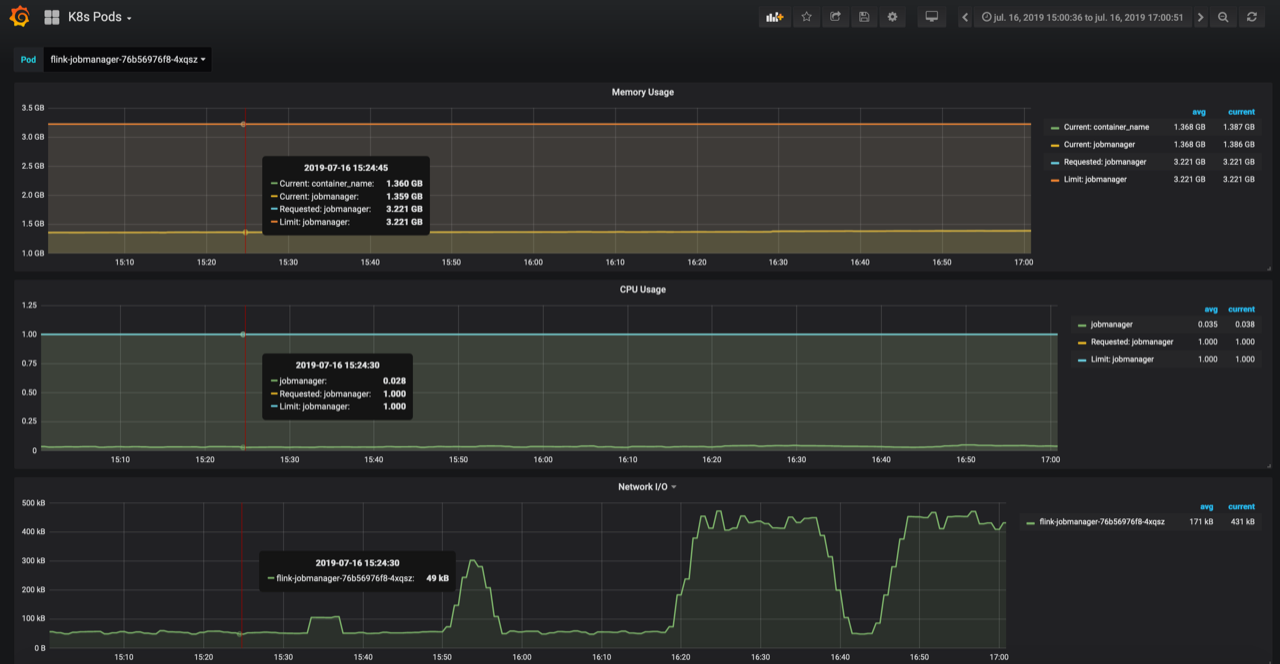Fwd: instable checkpointing after migration to flink 1.8
Fwd: instable checkpointing after migration to flink 1.8
|
Sending again with reduced image sizes due to Apache mail server error.
|
Re: instable checkpointing after migration to flink 1.8
|
Hi Bekir Sorry for the previous message, I didn't see the second image of your first message :( From the second image of your first message, seems the sync part consumes too much time. 57 15:40:24(acknowledgement Time) 15m53s (End to End Duration) 464m(State size) 15M48s(Checkpoint Duration(Sync)) 4s(Checkpoint Duration (Async) Do you enable incremental checkpoint or not? If you enable incremental checkpoint, then In the sync part of a checkpoint for a RocksDBStateBackend, we'll 1) flush all data from memory to sst files, 2) snapshot meta, 3) checkpoint the RocksDB, maybe we should check the disk info during the long checkpoint. If you disable incremental checkpoint, then in the sync part of a checkpoint for RocksDBStateBackend, we'll 1) snapshot meta; 2) get a snapshot from RocksDB And another question for this is, do you ever change the user jar's logic when migrating from 1.6 to 1.8? Best, Congxian Bekir Oguz <[hidden email]> 于2019年7月17日周三 下午5:15写道:
|
Re: instable checkpointing after migration to flink 1.8
|
Hi Congxian,
Yes we have incremental checkpointing enabled on RocksDBBackend. For further investigation, I have logged into one task manager node which had 15 min long snapshotting and found the logs under some /tmp directory. Attaching 2 logs files, one for a long/problematic snapshotting and one log file for a good/fast snapshot. I know the problematic snapshot from the trigger time (14:22 today) on the task manager, that’s only a guess and I extracted the log events around that time in the bad_snapshot.log file. And I also extracted events from 14:11 today from the same task manager in the good_snapshot.log file to be able to compare these two. The only difference I can see is the compaction kicking in during the checkpointing in the bad_snaphot.log file. Do these logs give more insight to explain what is going on? Kind regards, Bekir Oguz
|
Re: instable checkpointing after migration to flink 1.8 (production issue)
|
Hi Congxian,
Starting from this morning we have more issues with checkpointing in production. What we see is sync and async duration for some subtasks are very long but what strange is the total of sync and async durations are much less than the total end to end duration. Please check the following snapshot:  For example, for the subtask 14: Sync duration is 4 mins, async duration 3 mins, end-to-end duration is 53 mins!!! We have a very long timeout value (1 hour) for checkpointing, but still many checkpoints are failing, some subtasks cannot finish checkpointing in 1 hour. We really appreciate your help here, this is a critical production problem for us at the moment. Regards, Bekir
|
Re: instable checkpointing after migration to flink 1.8 (production issue)
|
Hi, Bekir First, The e2e time for a sub task is the $ack_time_received_in_JM - $trigger_time_in_JM. And checkpoint includes some steps on task side such as 1) receive first barrier; 2) barrier align(for exactly once); 3) operator snapshot sync part; 4) operator snapshot async part, the images you shared yesterday show that the sync part took a too long time, now the sync part and async part took some time long, and e2e time is much longer than sync_time + async_time. 1. you can checkpoint whether your job has backpressure problems(backpressure may lead the barrier flows too slowly to the downside task.), if it has such a problem, you should better solve it first. 2. If do not have a backpressure problem, you can check the `Alignment Duration` to see if the barriers align took a too long time. 3. for sync part, maybe you can checkpoint the disk performance(if there did not have the metric, you can find the `sar` log in your machine) 4. for the async part, we can check the network performance(or some client network flow control) Hope this can help you. Best, Congxian Bekir Oguz <[hidden email]> 于2019年7月18日周四 下午6:05写道:
|
«
Return to (DEPRECATED) Apache Flink Mailing List archive.
|
1 view|%1 views
| Free forum by Nabble | Edit this page |



